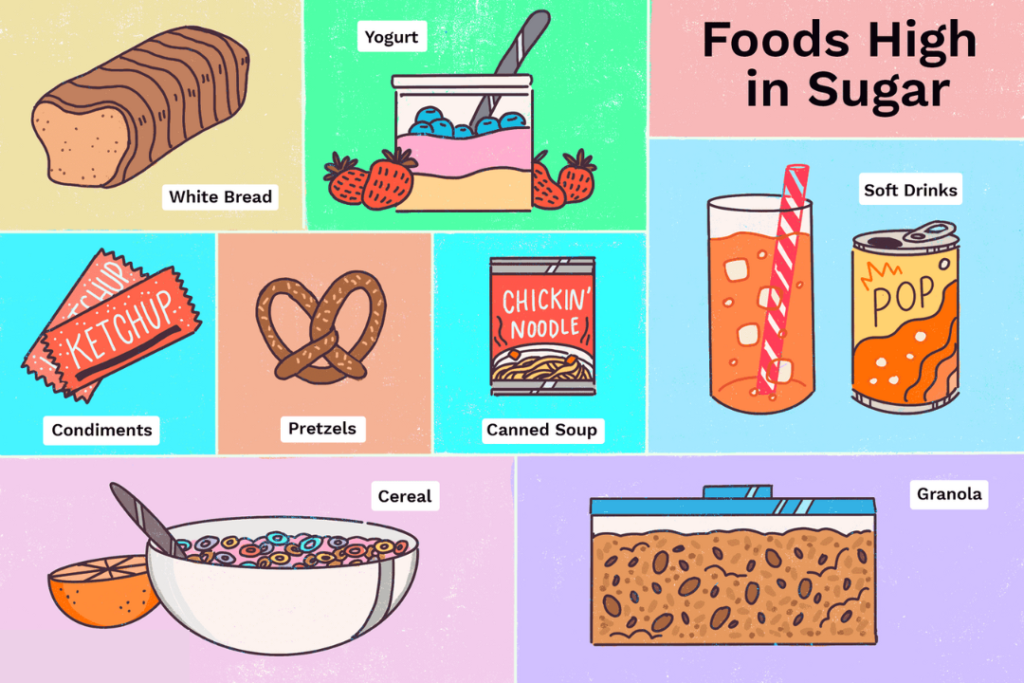Table of Contents
ToggleHow Many Grams of Sugar Per Day
One crucial aspect of maintaining a healthy lifestyle is the amount of sugar you consume daily. The question on everyone’s mind is, “How many grams of sugar per day is considered healthy?” This guide will delve into the recommended sugar intake, its impact on your health, and practical tips to make informed dietary choices.
As you may know, sugar is our biggest enemy in our diet. Many studies suggest that too much sugar addiction can contribute to various diseases, including Type 2 Diabetes, obesity, and heart disease. So, to break sugar cravings, we need to break sugar addiction.
First, I would like to mention that there are different types of sugar. Foods such as vegetables and fruits do contain natural sugars. This natural sugar found in whole natural foods is fine to eat. Except maybe for people who are suffering from diseases such as diabetes and obesity, they should limit that type of sugar too. I want to clarify that when I refer to sugar in this article, I mean the “regular kind.”
| Age Group | Recommended Daily Sugar Intake (grams) |
|---|---|
| Adults | 25 grams (approximately 6 teaspoons) |
| Children | 12-20 grams, depending on age |
How Many Grams of Sugar To Eat Per Day?
It is a fact that sugar consumption has increased dramatically in the past few decades. At the same time, diseases like diabetes, obesity, and others have advanced at an alarming rate. according to the USDA, consumption increased by 43 pounds per person, or 39 percent, from 1950 to 1959 until 2000. That year, the average person consumed 152 pounds of sugar.
How is that even possible?
Sources claim that the current daily sugar consumption in America is about 87 grams per day (350cal, 17.4 tsp), and according to a USDA report in 2010, the average child consumes 365 calories of added sugar per day, or 91 grams (18.2 tsp).
Also read: Sugar Addition […and How To Break It!]
How many grams of sugar per day are recommended?
- The American Heart Association (AHA) recommends 37 grams for men (150 cal, 7.4tsp) and 25 grams for women (100 cal, 5tsp).
- The United States Department of Agriculture (USDA) recommends 32 grams (128cal, 6.4tsp) for a 2000-calorie diet.
- The American Diabetes Association (ADA) doesn’t provide specific guidelines but claims that it can be substituted for other carbohydrate sources in moderation.
How Much Sugar Per Day I Suggest
Most nutrition and health authorities recommend limiting sugar. If you’ve been reading my blog for a while, then you will know that I think sugar is addictive, much like other substances of abuse. For people who have a hard time controlling sugar cravings and are unable to clean up their diet, I recommend eliminating sugar.

If you’re not a junk food and sugar addict, then it’s okay to have some when the social circumstances call for it, for example, on birthdays and Christmas. There is no physical need for added sugar, and when eaten in large amounts, it makes people sick and unhealthy.
Sugar is addictive, leads to cravings and overeating, rots your teeth, makes your breath bad, increases body fat, may lead to disease, and the list goes on and on and on. I think overweight people could lose a decent amount of weight simply by eliminating sugar, which includes ALL types of added sugar, including those labeled as corn syrups.
Recently, uber-healthy big wave surfer Laird Hamilton has been more and more vocal about his high-fat, no-sugar diet. He’s even been called a radical evangelist of fitness. He has some interesting ideas, and I highly recommend you look further into his mantra.
How Many Grams of Sugar Should You Have to Lose Weight?
The American Heart Association (AHA) advises against consuming more than 25 grams of added sugar each day in order to lose weight and improve your overall health.

Calorie intake is more crucial to track when trying to lose weight than sugar intake. Nonetheless, it is advisable to follow the American Heart Association’s (AHA) recommendations, which include consuming no more than 25 grams of added sugar each day.
Men: Added sugar should make up 150 calories or less (37.5 kilograms or 9 teaspoons) per day.
Women: Added sugar should make up up to 100 calories (about 25 grams or 6 tablespoons) per day.
Slightly different restrictions apply in the Dietary Restrictions for Americans, which suggest limiting your daily calorie intake from added sugars to no more than 10%. For instance, if an individual consumes 2,000 calories a day, added sugars should account for no more than 200 of those calories.
Sugar won’t always stop you from cutting fat or weight. When you burn more calories than you take in, you lose weight. However, consuming too much sugar might result in weight gain since excess sugar is stored as fat in the body.
How Many Grams Of Sugar Per Day For a Child
A typical child consumes far more added sugar in his diet and beverages than is healthy. 17% of the daily diets of youngsters are composed of sugar on average. Cocktails with added sugar account for half of that.
How do you lessen the amount of additional sugar your toddler eats? The following recommendations are made by the AAP:

- For children two years of age and up, try to limit their daily intake of added sugar to less than 25 grams, or roughly 6 teaspoons. If a youngster is younger than two years old, do not serve them food or beverages with added sugar.
- Offer milk and water in place of soda, fruit drinks, sports drinks, sweet tea, and sweetened coffee. Lactose is a natural sugar found in milk. In addition, it gives kids the calcium, protein, vitamin D, and other nutrients they require.
- Be wary of hidden sources of added sugar in processed foods such as salad dressing, baked beans, dried cranberries, and ketchup.
- Use whole fruit to satisfy your child’s sweet tooth.
- Don’t drink more than 100% fruit juice. Each dish has more sugar than the entire fruit. For kids ages 1 to 3 years old, the American Academy of Pediatrics advises consuming no more than 4 ounces of 100% fruit juice per day; for kids ages 4 to 6, 4 to 6 ounces; and for kids ages 7 to 14, 8 ounces. Give fruit juice to babies no older than one year.
Final Thoughts
So, here’s my opinion on how much sugar per day is NONE. And that doesn’t include overeating on cheat days 1-2 times per week. It’s like any other poison, nicotine, for example. A tiny bit won’t kill you, but none is the best choice. You can find more of the basics of sugar, what it does to us when included in our daily diet, and how we can break a sugar addiction and its associated break sugar cravings.
The Basics
To answer the question of how many grams of sugar per day is acceptable, it’s essential to turn to reputable health organizations. According to the World Health Organization (WHO), adults’ recommended daily sugar intake should not exceed 25 grams, equivalent to approximately 6 teaspoons. The limit is even lower for children, ranging from 12 to 20 grams, depending on their age.
Differentiating Between Added and Natural Sugars
It’s crucial to distinguish between added sugars and those naturally occurring in foods. Fruits, for example, contain natural sugars accompanied by fiber and essential nutrients. On the other hand, added sugars in processed foods contribute empty calories without nutritional benefits. Keeping an eye on added sugars is key to maintaining a healthy diet.
The Impact of Excessive Sugar Consumption on Health
Health Risks
Excessive sugar intake has been linked to various health issues, including obesity, type 2 diabetes, and cardiovascular diseases. Understanding the risks associated with high sugar consumption is vital for making conscious choices about what we eat.
Frequently Asked Questions
Q: How does sugar impact my overall health?
Excessive sugar consumption is associated with increased risks of obesity, diabetes, and cardiovascular diseases. Moderation is key to a healthy lifestyle.
Q: Can I consume natural sugars found in fruits without worrying about health risks?
Yes, the natural sugars in fruits come with essential nutrients and fiber, making them a healthy choice. It’s the added sugars in processed foods that should be limited.
Q: How can I reduce my sugar intake without feeling deprived?
Gradually reduce added sugars in your diet, opt for whole foods, and experiment with natural sweeteners like honey or maple syrup in moderation.
Q: What is the recommended daily limit for sugar intake?
The American Heart Association recommends that adult men limit their daily sugar intake to no more than 38 grams (about 9 teaspoons), and adult women should aim for no more than 25 grams (about 6 teaspoons) of added sugars. This guideline is meant to promote overall health and reduce the risk of chronic diseases.
Q: Why is it important to limit sugar intake?
Excessive sugar consumption has been linked to various health issues, including obesity, type 2 diabetes, heart disease, and tooth decay. Monitoring and limiting daily sugar intake can contribute to better overall health and help prevent these chronic conditions.
Q: How can I track the grams of sugar I consume daily?
To monitor your sugar intake, read nutrition labels on packaged foods, paying attention to both added and naturally occurring sugars. Keep in mind that ingredients like high-fructose corn syrup, agave nectar, and other sweeteners contribute to the total sugar content. Additionally, be cautious of hidden sugars in seemingly “healthy” foods.
Q: Are all sugars the same, or are some better than others?
Not all sugars are equal in terms of their impact on health. While naturally occurring sugars in fruits and dairy come with beneficial nutrients, added sugars found in many processed foods offer empty calories. It’s generally recommended to prioritize whole foods and limit added sugars to promote a balanced and nutritious diet.







